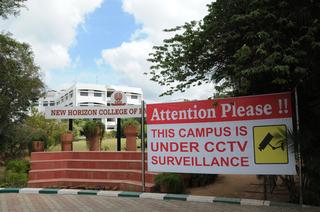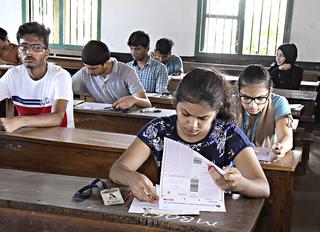The Karnataka Examinations Authority (KEA) has issued notices to 351 students who secured engineering seats under the government quota but failed to report to colleges after allotment. Authorities suspect these students may have engaged in “seat blocking,” a malpractice in which aspirants block affordable government seats only to later abandon them for private or management quota admissions, leaving many deserving candidates without opportunities. The KEA stated that strict action would be taken if explanations are not provided within the stipulated period, warning that students could face disqualification from future counseling rounds.
Seat blocking has long been a contentious issue in the state’s higher education sector, particularly in engineering admissions. While government quota seats are subsidized and intended to help meritorious students, the practice of booking these seats without genuine intent has undermined the fairness of the system. Education experts have pointed out that such manipulation not only deprives deserving candidates but also results in wastage of resources for institutions struggling to fill their classrooms. The KEA emphasized that this year, it is determined to curb the menace by deploying tighter monitoring, tracking student enrollment after allotment, and ensuring accountability from both students and institutions involved.
The controversy has triggered a fresh debate about the effectiveness of the existing counseling and seat allocation process in Karnataka. Student groups have welcomed the move against defaulters but urged for systemic reforms, including stricter documentation requirements and penalties for repeated offenders. Meanwhile, private institutions argue that the issue reflects deeper challenges in balancing government and private sector interests in higher education. With nearly 351 students under scrutiny, the KEA’s next steps are being closely watched as they could set a precedent for curbing admission malpractices.
Education Stakeholders React to KEA’s Crackdown
The KEA’s action has received mixed responses from stakeholders across the education sector. Parents’ associations hailed the move as a long-overdue measure to restore fairness in the admission system, stating that many hardworking students have been denied their rightful chance because of manipulation. On the other hand, some student organizations criticized the KEA, claiming that delays in counseling rounds, lack of clear communication, and sudden changes in seat allotment often contribute to confusion and non-reporting. They argued that the authority must improve transparency and efficiency in the counseling process to reduce disputes and misunderstandings.
College administrators have also voiced concern, pointing out that government quota seats left vacant due to non-reporting often go unfilled, creating financial and logistical challenges for institutions. Engineering colleges in tier-two cities have been particularly affected, as vacant seats reduce their intake and undermine resource allocation. Some private management representatives, however, allege that the real issue lies in the low demand for certain branches of engineering, which pushes students to abandon government seats after securing alternative options. Nonetheless, the KEA has maintained that intentional blocking of seats will not be tolerated and has promised reforms in the upcoming admission cycles.

Push for Reform in Admission System
As the controversy intensifies, policymakers are now being urged to strengthen the regulatory framework governing engineering admissions in Karnataka. Experts recommend adopting digital tracking systems to monitor student enrollment, mandating financial deposits to discourage frivolous seat blocking, and imposing stricter penalties for defaulters. Some have even suggested linking seat acceptance to Aadhaar-based verification to ensure accountability. While the KEA’s current crackdown has set a strong example, educationists argue that without long-term reforms, the problem is likely to resurface in future admission cycles. For now, the spotlight remains on the 351 students who face notices, with their responses expected to shape the state’s next move in curbing this malpractice.

The issue of seat blocking is not new in Karnataka, and every year thousands of students face hurdles because of this recurring malpractice. The engineering admission process is already complex, involving multiple rounds of counseling, document verification, and reporting. When students deliberately fail to join after being allotted government quota seats, the problem escalates, leaving deserving candidates with fewer chances. This malpractice often forces students to settle for less preferred branches or colleges, undermining their academic aspirations. The KEA has emphasized that such irregularities must be rooted out to ensure justice for hardworking students.
Many parents have expressed frustration with the current system, arguing that while KEA is right to punish those who block seats, the authority must also recognize the root causes that push students into such practices. One common complaint is the delay between different rounds of counseling, which creates uncertainty. Students sometimes keep a government quota seat as a backup option while waiting for results from private colleges, other states, or even overseas universities. Parents say without streamlining timelines, seat blocking will remain a recurring challenge despite penalties.
Education activists have suggested that the government should introduce a refundable caution deposit for students accepting government quota seats. This would discourage frivolous blocking, as the deposit could be forfeited if students fail to report without valid reasons. A similar system is already in practice in some states, where students are financially accountable for non-compliance. By enforcing such measures, KEA could reduce the misuse of seats and ensure that deserving candidates are not denied opportunities because of manipulation.
Colleges too have faced serious consequences due to vacant seats left behind by non-reporting students. Engineering institutions in rural areas are particularly impacted, as they struggle to maintain required intake for sustainability. Vacancies in key branches like Computer Science and Electronics, which are already in high demand, hurt institutional reputation and academic planning. In some cases, colleges have had to run classes with fewer students, leading to resource wastage and additional strain on faculty. This has prompted managements to back KEA’s decision to act firmly against seat blockers.
Interestingly, this year’s crackdown comes amid declining demand for certain engineering branches like Civil and Mechanical, which remain undersubscribed despite government quota incentives. Experts note that while students scramble for IT-related branches, traditional streams suffer neglect. This imbalance creates another layer of seat blocking, as some candidates initially block non-preferred seats only to later abandon them for a chance at more lucrative streams. Authorities say reforms must address both branch demand disparities and systemic loopholes if the problem is to be solved in the long term.
The political class has also taken interest in the controversy, as it touches upon broader questions of access to education in Karnataka. Opposition leaders have accused the ruling government of failing to anticipate and prevent such malpractices. They argue that without reforming the overall seat allocation mechanism, simply issuing notices will not eliminate the issue. In response, ruling party representatives have highlighted KEA’s vigilance this year as a step forward and insisted that technology-driven monitoring will make the process more foolproof in future admission cycles.
Student organizations have demanded that KEA publish a detailed report on why so many students did not report after allotment. They claim that not all 351 students may be guilty of intentional seat blocking, as some might have been caught in the web of counseling delays or miscommunication. These groups insist on a case-by-case investigation before imposing penalties. They also recommend better communication channels, such as real-time updates via mobile apps and dedicated helplines, to reduce confusion during the counseling and seat reporting process.
Some private education consultants, who guide students during admissions, have pointed out that many families face indecision due to multiple overlapping admission cycles across states. In such cases, parents encourage their children to secure government quota seats in Karnataka as a safety net while exploring options elsewhere. While consultants agree that seat blocking is unfair, they believe only better coordination between state-level authorities and institutions can address the root of the problem. Otherwise, students will continue to misuse the system to avoid risks in their academic planning.
Legal experts have weighed in, noting that KEA’s issuance of notices must comply with due process to avoid challenges in court. If students feel they are being unfairly penalized, they may approach the judiciary, leading to prolonged legal battles. Experts say the authority must create watertight guidelines with clear definitions of intentional malpractice versus genuine reasons for non-reporting. Establishing such legal clarity would ensure that punitive measures are not struck down and that future seat allocation runs smoothly without loopholes being exploited.
For now, the spotlight remains firmly on the 351 students who have been served notices. Their responses will decide whether they face disqualification or more lenient measures. The KEA has assured that this exercise is not merely punitive but also corrective, aimed at reforming the system for future academic years. With growing scrutiny from parents, students, colleges, and political circles, the outcome of this case could set a precedent in tackling admission-related malpractices. The state’s education sector is closely watching how KEA enforces accountability while balancing fairness and opportunity for all.
Follow: Karnataka Government
Also read: Home | Channel 6 Network – Latest News, Breaking Updates: Politics, Business, Tech & More

